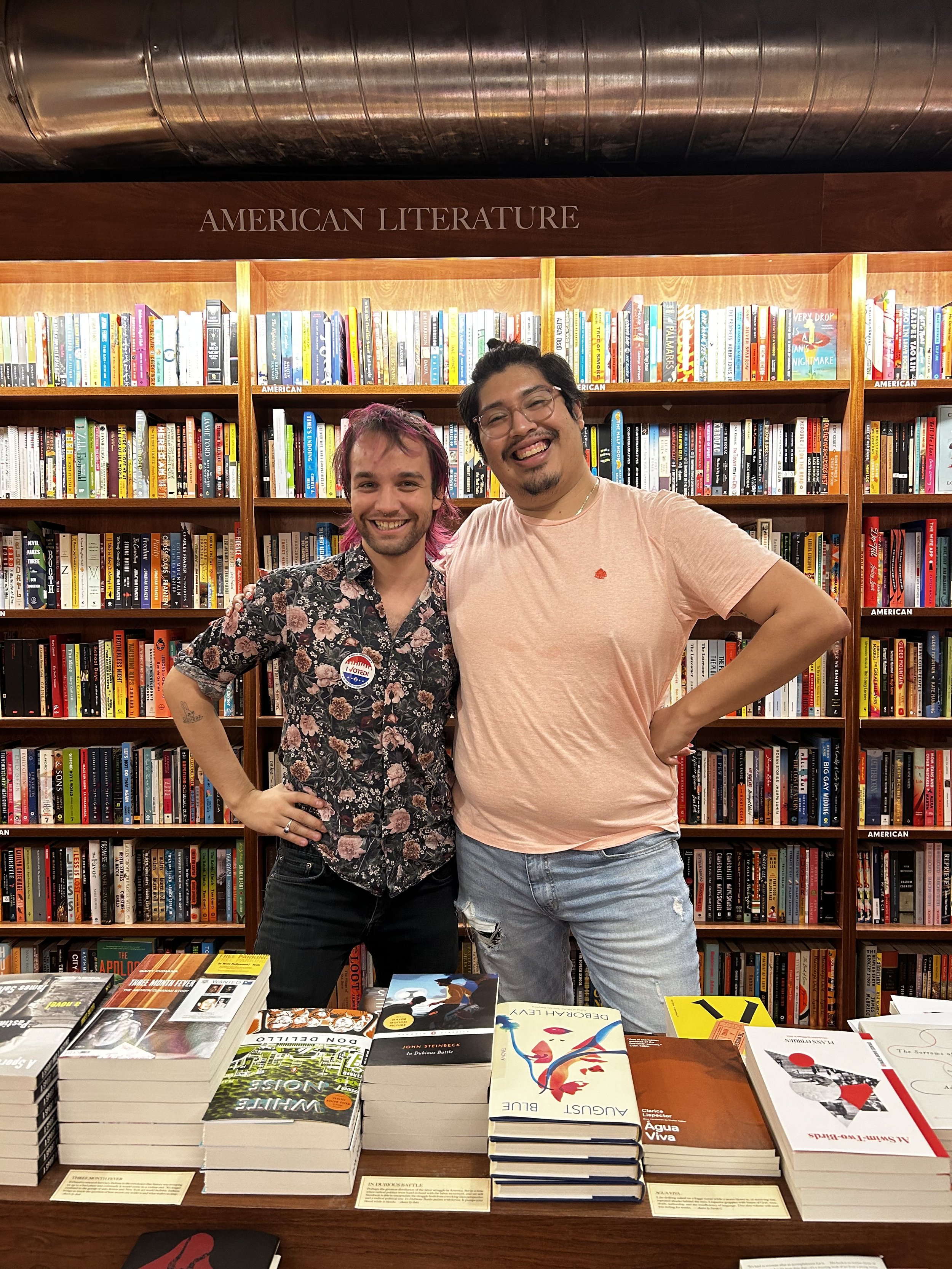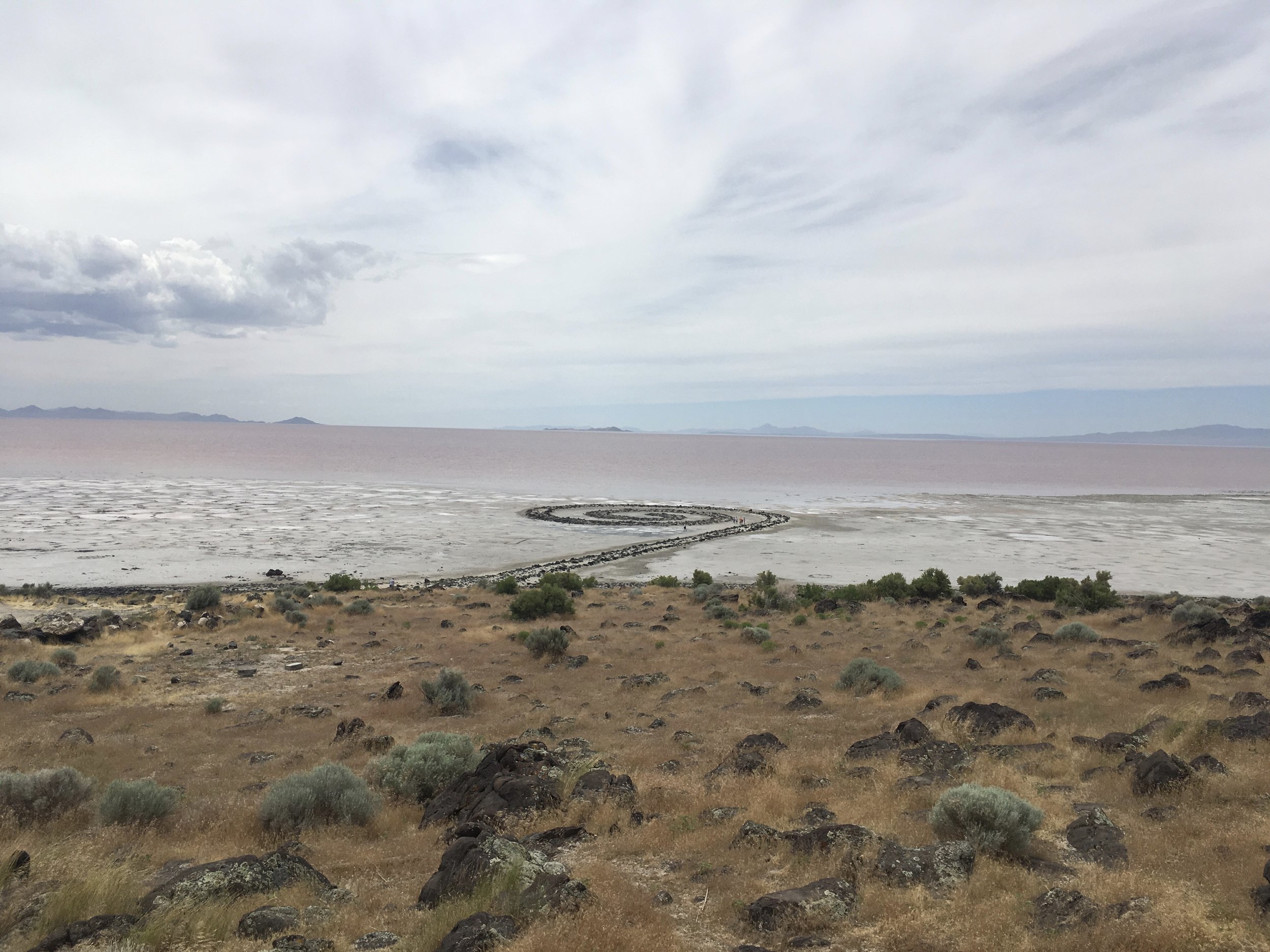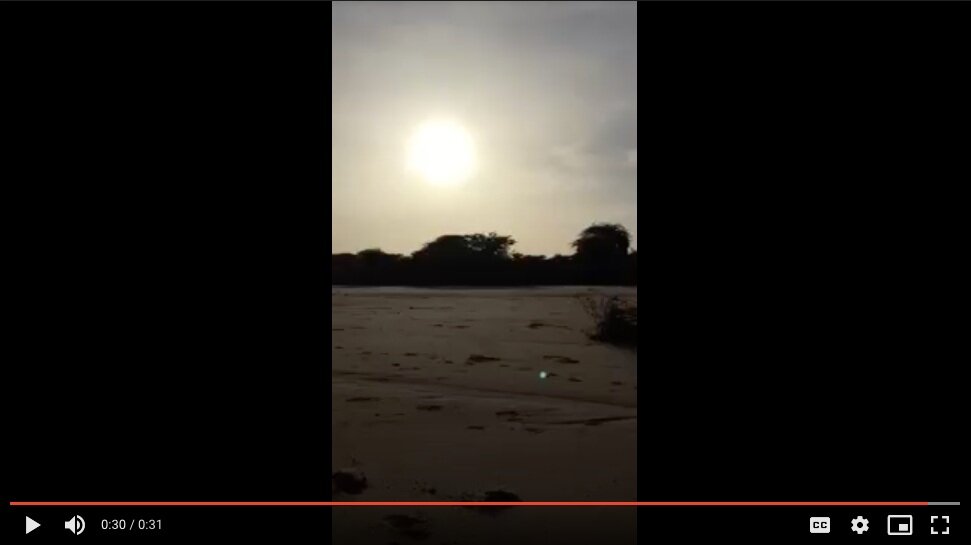JACOB MUSELMANN: I'm watching the LA fires burn across our screens and feeling sad for the world. It feels like a weird time to be writing poems. Rereading yours, one gets the sense that living is dirty business, and when I look out across the day's headlines, that's very much what's in the air.
In your lovely poem, being "clean" strikes a religious or spiritual tone for me, maybe even nodding at a zeal that verges on fascistic—although I think I'm primed to see that in lots of things these days. Identifying oneself as "clean" also recalls hookup app slang.
Would you mind sharing how the poem came about? I'm very curious!
HEATHER GLYNIS: It is a deeply weird time to be writing poems. Perhaps it always is, perhaps living is always a dirty business -- but the dirt and weirdness do seem so much more evident right now.
2025 has already proven to be a real dirty weird humdinger of a year. My roommate and closest friend has had a major mental health crisis, and in the midst of that, a variety of problems ranging from rampant mold to shoddy gas meters have come to the fore in my apartment. I'm in the midst of gathering a case to break the lease or even go to the DOB while searching for a new living situation. And of course our country is what it is. I'm a tranny and a poet, what was I expecting from this life? Dirty business!!! That's our lot I suppose.
Anyway. You definitely clocked the tea of my poem impeccably, I was feeling through the fascistic edge of the idea of being "clean," of how Western religion (I was raised Catholic) sells us on this idea of purity - both in body and spirit - that is impossible. That will kill us in the end. The truth of it is everything is dirty, there is no purity, that underneath the layers of grime is only a different grime. As my kitchen floor was ripped up this week, an older more baroque tile pattern was revealed underneath. Like the posters in the subway! There's no artifice because it's all artifice, one advertisement conceals another. The mask is the face is another mask, what's new is old is older, and all of it is a tool of a manipulative capitalist machine that will never make us clean, only exhausted and broke or worse. Not to sound too glib and broad stroke-y. But you get the gist.
I've let plenty men fuck me without protection, many who were nameless strangers. That could be seen as a dirty, irresponsible act. But it's also not outside the norm for a lot of my friends and community. I've somehow never caught an STI from this behavior - am I more clean than someone who got a disease from sleeping with a single infected lover? Am I dirty and lucky?
Those experiences could be sullying, or they're just bits of patina that form the self. Dirt can bring illness, but it also brings character, atmosphere, a sense of life lived. Saints are boring in that they don't get fucked, with or without a condom.
Which brings me to your poem! Also about sex and artifice. I love the way you relish the crass, petty, American grotesquerie we're all bathing in. You're critical, but a smile is cracked. The power that is flaunted before us is "blissfully, addictively possible" as much as it's obviously kind of evil. What kind of world, where even sex has to compete? There's bodily communion and there's The Price is Right. Can the authentic compete? If all of it is a display, what's authentic? How much we are, must be, a ball of broken mirrors.
What brought this poem on for you? The "Lightning Round" in the title seems to refer to a game show like The Price is Right, but I sense another valence there, no?
JM: I'm so sorry to hear about the chaos at home, and during such bitter, hell-bitten frost at that. I really hope things turn around soon.
I like thinking about past experiences as sparkly bits of patina that could make us more brilliant, and this artifice onion you're cooking up. Even if we could peel away that last layer, for some reason I doubt it would scratch the itch.
The scenario you bring up about lovers and STIs got me thinking about what those words really mean. I will pull over, put my hazards on, and attempt to break it down as I see it:
On a literal level, if something is dirty, it has been through something and has the evidence to show it. If something is clean, it may or may not have experienced the exact same thing; it’s just that it has nothing to show for it, ultimately making the experience moot. Dirtiness then is not based on actions, but on the thing’s ability to absorb or repel its marks. Which seems intrinsic and beyond a thing’s control. So to be seen as dirty, then, is actually not so much about what someone has done but what they’re made of. Which is maybe why the term feels so intolerant and pernicious.
And as for my poem, thanks! I wrote it during an era of the pandemic when I was watching a lot of game shows, thinking about overstimulation at a time when I was very understimulated.
I was also startled by how numbed out everyone was becoming, where something as amazing as sex could somehow begin to lose its luster to, say, crowdsourcing dopamine, nursing an addiction, or winning the game. And how the exhaustion of playing the game—the capitalist game, the gay male game (in my case), the art world game, the love game (paws up lol), whatever it may be—can render you an object, a commodity, and perhaps, yes, a piece of physical or psychological furniture for someone else. I’ll go out on a limb and say this is due to relentlessly repeating patterns of power—often a key ingredient of artifice—where agency succumbs to exhaustion.
As for the title, there was something that felt cosmological and big-bangy about lightning, and that’s definitely the scale I was thinking at when I started this piece—about how at some point, sex needed to evolve into something that felt supremely bonkers or else we wouldn’t continue as a species.
And in game shows, of course, I think of a lightning round as a short, sudden interval where the rules might be suspended or changed, and where everything is suddenly on the line. In many ways, that feels like where we've arrived at in America.
For some reason a palimpsest has always been a potent image for me. And in your poem’s title, it seems to be equated, or given equal weight, to the virtue of taking pride in one’s life. How did it come to you? Read anything good lately?
HG: We are all commodities, and it's exhausting. How do we maintain some grace and agency amidst the constant capitalistic shuffle? How do we still have good sex? Write poems that don't feel dessicated? None of this has felt obvious or easy to me recently.
With regards to reading, I've been rereading Denis Johnson's The Incognito Lounge, one of my favorite poetry collections ("Living one: you move among many / dancers and don't know which / you are the shadow of; / you want to kiss your own face in the mirror / but do not approach, / knowing you must not touch one / like that.") He's so good, deeply vivid in each line, and something tells me he would have made an excellent husband to a doll. In the shuffle I've also been dipping between Palestine: A Socialist Introduction, Cobra by Severo Sarduy, and Gravity and Grace. I've been listening to a lot of Lucinda Williams and Nina Simone.
What've you been reading? What's been moving you of late?
JM: So I just found a poem of Johnson's that reads, in part, "you're just an erotic hallucination, / just so much feverishly produced kazoo music, / are you serious?" So um, yeah...that's it, the frequency that wakes me up.
Before bed, I've been having a go at The Stories of John Cheever. It’s a bit surreal, ominous, still, sure. I like it. I usually nod off and then completely forget what I read the next night. I really like it. I doubt I will ever finish.
On the train I’m e-reading Birds of America, a collection of short stories by Lorrie Moore. I’d randomly bought her novel Anagrams a few years back and it plumb bonked me noggin. The flavor of prose is just right for me, and now I probably must read all of her things. It was the same with Lydia Davis. Does that ever happen to you?
From Birds: “Out the window, there was an afternoon moon, like a golf ball, pocked and stuck. She looked at the calcified egg of it, its coin face, its blue neighborhood of nothing.”
I’m also kinda-sorta warming up to audiobooks, but just memoirs. The voiciness really lends itself to it. Now and again I'll put on Dolly Parton’s, which is more of a casual Q&A than an intricately edited memoir. I just like to hear her talk, partly for her outlook, partly because she sounds like my mom. She’s her own person. She’s got it all figured out.
HG: I adore Cheever. His frustrated queerness of course caused him great pain, but it does his stories good. The placidity of his Westchesters and Ossinings all seethe at the fringes, the flesh crawling, freedom somewhere but not here in this ostensible paradise. He was a great writer of artifice.
I'll leave you with this passage from Sarah Schulman's Maggie Terry, which I've been reading recently. Spring is a season of hope, but perhaps it too is a kind of artifice, a veil behind the dog days and eventual winter. Or I'm being cheap and cynical! Anyway:
"New Yorkers are soft and kind because they live in front of each other and understand the fragility of human complexity. New Yorkers are tough and crusty because they spend half the year sweating in a hotbox of bodies, surrounded by vermin and stinking garbage, and the other half freezing, in boxes without enough heat and rattling windows, waiting for the snowplows to get there. There was that one week, euphemistically known as ‘spring’ when any stranger could naively think: What a delightful place to live. The cherry blossoms fill the trees, the sky is clear and bright, smiles and skin awaken each other. Everyone is sexy, people fall in love, and have great ideas that other people agree to allow to succeed. There is life. It is a remarkable moment of yes, yes, yes. And there is an excitement about living and forgiving and creating new worlds in the midst of this temporary beauty, this illusory restorative clarity, and this rare clean feeling. And then, suddenly, it is hot again. And everything droops: hopes, collars, and wills."









